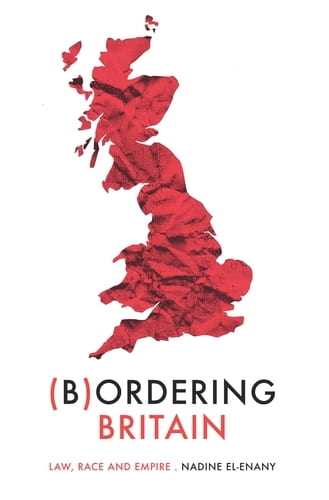The MMB reading group is a forum to discuss migration and mobility related texts that MMB members have enjoyed reading and are keen to debate. It takes place on Wednesday lunchtimes every three to four months online. Check out our Events page for the next meeting.
Please let the MMB team know if there is an article or book you would like to discuss with the group in the future.
Previous Reading Group texts:
Border Walls Gone Green
February 2024 – Border Walls Gone Green: Nature and Anti-immigrant Politics in America (University of Minnesota Press, 2015).
Border Walls Gone Green examines American debates over the environmental impacts of immigration, making the case that nature is increasingly deployed to subtly fortify territorial boundaries. John Hultgren finds that the well-intentioned efforts of environmentalists to ‘sustain’ America are in fact reinforcing exclusionary forms of political community.
How is it that self-identified environmental progressives in America can oppose liberalizing immigration policies? Environmentalism is generally assumed to be a commitment of the political left and restrictionism a commitment of the right. As John Hultgren shows, the reality is significantly more complicated. American environmentalists have supported immigration restrictions since the movement first began in the late 1800s, and anti-immigration arguments continue to attract vocal adherents among contemporary mainstream and radical ‘greens.’

The Digital Border
November 2023 – The Digital Border: Migration, Technology, Power (NYU Press, 2022).
How do digital technologies shape the experiences and meanings of migration? As the numbers of people fleeing war, poverty, and environmental disaster reach unprecedented levels worldwide, states also step up their mechanisms of border control. In this, they rely on digital technologies, big data, artificial intelligence, social media platforms, and institutional journalism to manage not only the flow of people at crossing-points, but also the flow of stories and images of human mobility that circulate among their publics.
What is the role of digital technologies is shaping migration today? How do digital infrastructures, platforms, and institutions control the flow of people at the border? And how do they also control the public narratives of migration as a ‘crisis’? Finally, how do migrants themselves use these same platforms to speak back and make themselves heard in the face of hardship and hostility?

‘Writing as a nomadic subject’
May 2023 – by Rosi Braidotti (2014) in Comparative Critical Studies, 11(2-3), pp. 163-18.
‘My lifelong engagement in the project of nomadic subjectivity has been partly motivated by the conviction that, in these globalized times of accelerating technologically mediated changes, many traditional points of reference and age-old habits of thought are being re-composed, albeit in contradictory ways. Paradoxically, old power relations are not only confirmed but in many ways exacerbated in the new geo-political context.2 At such a time more conceptual creativity is necessary, and more theoretical courage is needed in order to bring about the leap across inertia, nostalgia, aporia and the other forms of critical stasis induced by our historical condition. It has become like a mantra to me: we need to learn to think differently about the kind of subjects we have already become and the processes of deep-seated transformation we are undergoing. The philosopher in me believes that a new alliance between philosophy, the arts and science is a crucial building block for this qualitative shift of perspective.3 The writer in me, on the other hand, continues to muse about the complex ways in which the imaginary both propels and resists in-depth transformations.’
‘Fanon’s mobilities: race, space, recognition’
March 2023 – by William Conroy in Antipode 2023.
‘[The paper] suggests that in particular historical-geographical contexts—such as those described by Fanon himself—geographical patterns of mobility and confinement operate as the presupposition and result of “race”; while also functionally enabling capitalism’s necessary and enduring dialectic of appropriation and capitalisation, and reproducing the Fanonian “zone of nonbeing”. More simply, this article suggests that in certain conjunctures the tight articulation of race, mobility, and capital accumulation inhibits the reciprocal recognition of equals. In those contexts, a spatialised “counter-ontological” politics is the only means of establishing intersubjective symmetry and the preconditions for Fanon’s “new humanism”. This article concretises these arguments in relation to historical work on antebellum “carceral landscapes”. It concludes by drawing explicitly on Stuart Hall’s reflections on articulation and “lines of tendential force” in order to think through the relevance of Fanonian theorisation today.’
‘Virtual migration, racism and the multiplication of labour’
December 2022 – by Moritz Altenried and Manuela Bojadžijev (2017) in Spheres 4, pp. 1-16.
Bridget says: ‘This is a really helpful paper to think about technological change and migration. It moves way beyond “refugee with smartphones” and gives us ideas about how we can start rethinking not only migration but also labour, and how race shapes both.’
Justice, Migration, and Mercy
April 2022 – Justice, Migration, and Mercy by Michael Blake (Oxford University Press, 2020).
Justice, Migration, and Mercy provides a vision of how we can understand the political morality of migration. It offers a novel, and plausible, account of the right to exclude on which that right is grounded on a more fundamental right to avoid unwanted forms of political relationship. Far from simply justifying exclusion, however, Blake examines the best justifications for exclusion in an effort to determine its limits. In doing so, he challenges the current global realities of migration which ensure open borders for a select few and closed borders for the majority, most often the most marginalized in society. His account sheds light on more specific questions of justice in migration, such as the permissibility of travel bans and carrier sanctions. He also offers a particular vision about how to go beyond questions of right and liberal justice, towards a declaration of the sort of community we wish to be. Blake then identifies the moral notion of mercy as a central one for the moral analysis of migration, a move which leads to the conclusion that we ought to show mercy and justice in constructing migration policy as well as in public debate.
Read a review of the book in Notre Dame Philosophical Reviews here.

Western Privilege
February 2022 – Western Privilege: Work, Intimacy, and Postcolonial Hierarchies in Dubai by Amélie Le Renard (Stanford University Press, 2021).
Nearly 90 per cent of residents in Dubai are foreigners with no Emirati nationality. As in many global cities, those who hold Western passports share specific advantages: prestigious careers, high salaries, and comfortable homes and lifestyles. With this book, Amélie Le Renard explores how race, gender and class backgrounds shape experiences of privilege, and investigates the processes that lead to the formation of Westerners as a social group.
Westernness is more than a passport; it is also an identity that requires emotional and bodily labour. And as they work, hook up, parent and hire domestic help, Westerners chase Dubai’s promise of socioeconomic elevation for the few. Through an ethnography informed by postcolonial and feminist theory, Le Renard reveals the diverse experiences and trajectories of white and non-white, male and female Westerners to understand the shifting and contingent nature of Westernness—and also its deep connection to whiteness and heteronormativity. Western Privilege offers a singular look at the lived reality of structural racism in cities of the global South.
MMB Reading Group coordinator Sarah Kunz will be interviewing Amélie Le Renard for the MMB Insights and Sounds 2022 series. This will be part of MMB’s ongoing MMB on ‘New writing on migration and mobilities’ across our blogs and events.
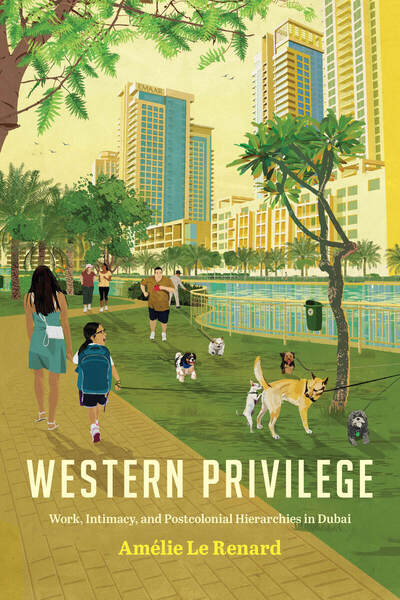
Deporting Black Britons
January 2022 – Deporting Black Britons: Portraits of Deportation to Jamaica by Luke de Noronha (Manchester University Press, 2020).
What is it like to be deported from everything you know, exiled from parents, partners, children and friends? How do people who left Jamaica as infants deal with their forced return? How do ‘Black Britons’ survive once they are returned to Jamaica, and what do their memories of poverty, racist policing and illegality reveal about contemporary Britain?
Based on years of research with deported people and their families, Deporting Black Britons presents stories of survival and hardship in the UK and Jamaica. These intimate portraits testify to the damage wrought by violent borders, opening up wider questions about racism, belonging and deservingness in anti-immigrant times. Visit the website for more details.

No Refuge
November 2021 – No Refuge: Ethics and the Global Refugee Crisis by Serena Parekh (Oxford University Press, 2020).
‘This book confronts the ethical dimension of the global refugee crisis. When most people think of the global refugee crisis, they think of Syrians crossing the Mediterranean in flimsy boats into Europe or caravans of Central Americans arriving at the US border. Yet behind these images there is a second crisis: refuge itself has all but evaporated for millions of people fleeing persecution and violence. Refugees have only three real options—squalid refugee camps, urban slums, or dangerous journeys to seek asylum—and none of these provide access to the minimum conditions of human dignity. No Refuge makes visible to readers the crisis that refugees experience in the twenty-first century: for refugees, there is no refugee.

Worldmaking after Empire
October 2021 – Worldmaking after Empire: The Rise and Fall of Self-Determination, Adom Getachew, Princeton University Press, 2019
Decolonization revolutionized the international order during the twentieth century. Yet standard histories that present the end of colonialism as an inevitable transition from a world of empires to one of nations—a world in which self-determination was synonymous with nation-building—obscure just how radical this change was. Drawing on the political thought of anticolonial intellectuals and statesmen such as Nnamdi Azikiwe, W.E.B Du Bois, George Padmore, Kwame Nkrumah, Eric Williams, Michael Manley, and Julius Nyerere, this important new account of decolonization reveals the full extent of their unprecedented ambition to remake not only nations but the world.
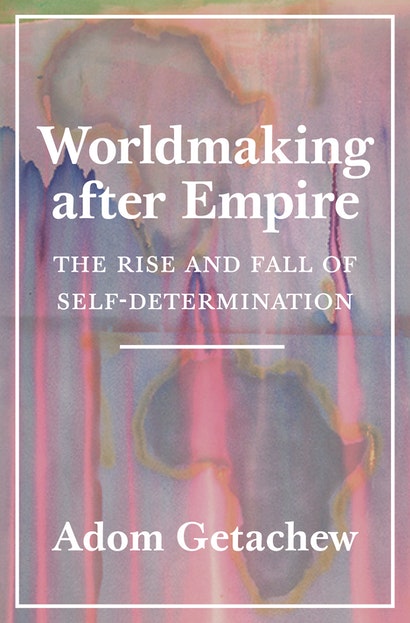
Immigration and Freedom
September 2021 – Chandran Kukathas, Immigration and Freedom (Princeton University Press, 2021).
Immigration is often seen as a danger to western liberal democracies because it threatens to undermine their fundamental values, most notably freedom and national self-determination. In this book, however, Chandran Kukathas argues that the greater threat comes not from immigration but from immigration control.
Kukathas shows that immigration control is not merely about preventing outsiders from moving across borders. It is about controlling what outsiders do once in a society: whether they work, reside, study, set up businesses, or share their lives with others.
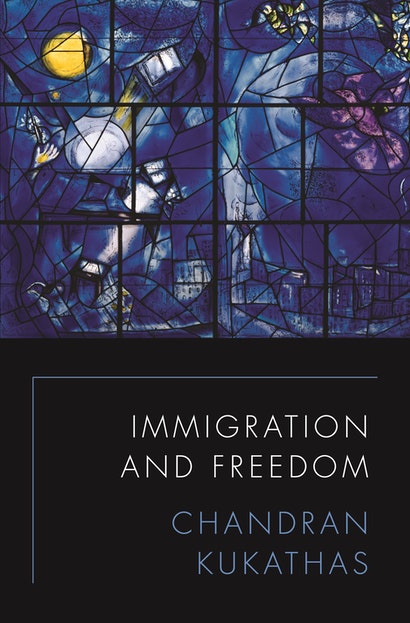
Drawing the Global Colour Line
June 2021 – Drawing the Global Colour Line: White Men’s Countries and the International Challenge of Racial Equality by Marilyn Lake and Henry Reynolds (Cambridge University Press, 2012).
In 1900 W. E. B. DuBois prophesied that the colour line would be the key problem of the twentieth century and he later identified one of its principal dynamics: the new religion of whiteness that was sweeping the world. Whereas most historians have confined their studies of race relations to a national framework, this book studies the transnational circulation of people and ideas, racial knowledge and technologies that underpinned the construction of self-styled white men’s countries from South Africa, to North America and Australasia.
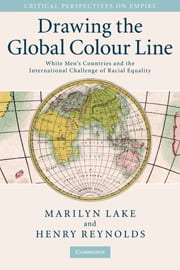
Home Rule
May 2021 – Nandita Sharma, Home Rule: National Sovereignty and the Separation of Natives and Migrants (2020, Duke University Press).
Nandita explores how the current political order of nation-states institutionalises the notion that each ‘people’ has its own place in the world by limiting access to national citizenship and authorised immigration. In her recent MMB blog, which draws on the Home Rule, Nandita writes:
‘This national regime of governmentality, which I term the Postcolonial New World Order, co-opted radical anti-colonial demands and replaced them with demands for national sovereignty. Calls for ‘national self-determination’, I argue, perverted demands for the return of expropriated land and for the freedom of labour from exploitative class relations. Instead of decolonisation, people got the postcolonial rule of nation-states.
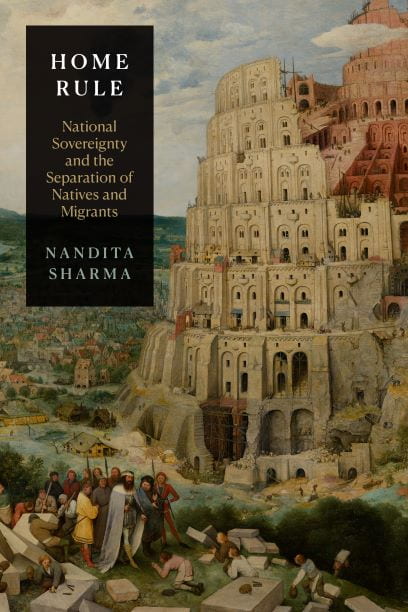
Mobility Justice
March 2021 – Mimi Sheller, Mobility Justice: The Politics of Movement in an Age of Extremes (Verso, 2018)
‘Sheller shows how power and inequality inform the governance and control of movement. She connects the body, street, city, nation, and planet in one overarching theory of the modern, perpetually shifting world. Concepts of mobility are examined on a local level in the circulation of people, resources, and information, as well as on an urban scale, with questions of public transport and “the right to the city.” On the planetary level, she demands that we rethink the reality where tourists and other elites are able to roam freely, while migrants and those most in need are abandoned and imprisoned at the borders.
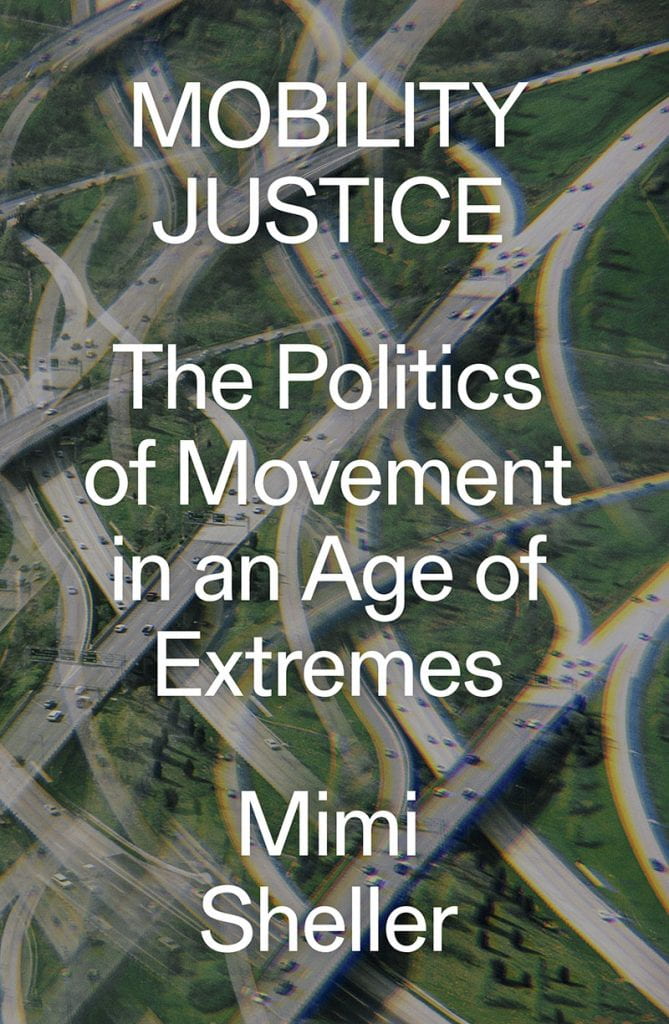
(B)ordering Britain
January 2021 – Dr Nadine El-Enany to discuss her recent book (B)ordering Britain: Law, Race and Empire (2020, Manchester University Press).
In the first meeting we will be joined by In this study El-Enany shows how British immigration and nationality law has emerged as an extension of British colonialism. In her own words:
‘Britain’s borders, articulated and policed via immigration laws, maintain the global racial order established by colonialism, whereby colonised peoples are dispossessed of land and resources. They also maintain Britain as a racially and colonially configured space in which the racialised poor are subject to the operation of internal borders and are disproportionately vulnerable to street and state racial terror. Britain is thus not only bordered, but also racially and colonially ordered, through the operation of immigration control’ (El-Enany, 2019).
